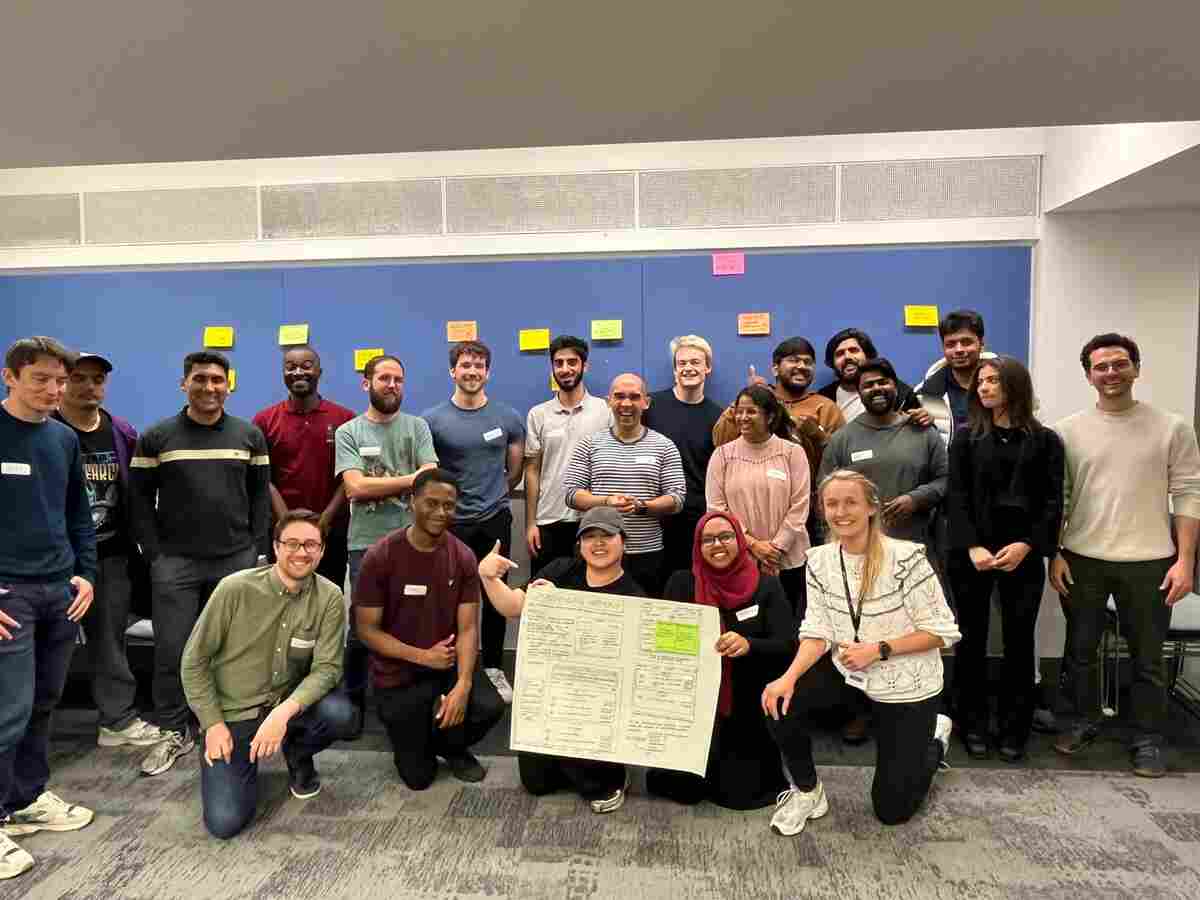
Image above: the winning teams and participants in the Harmony AI hackathon on 3 June 2024
A hackathon is an event that may last for a day or several days where people collaborate to solve a problem. The word “hackathon” is a portmanteau of “hack” and “marathon”. The first hackathon was held in 1999 by OpenBSD in Calgary, Canada[1]. Initially, hackathons were used for software development problems, but now organisations are running hackathons for a much more eclectic range of tasks, such as planning the marketing strategy of a nonprofit, and now there are AI hackathons.
An AI hackathon is an intensive event where programmers, data scientists, AI enthusiasts, and other tech professionals collaborate to train an AI model, or build innovative AI-powered solutions, within a specific timeframe. AI hackathons foster creativity, problem-solving, and rapid prototyping, and by bringing together a diverse range of participants, can benefit from new eyes on a project. AI hackathons can be run online or in-person.
The task of an AI hackathon could be:
You have one day in this room with free food and drink. Improve our customer churn model so that it will better identify customers who are about to switch to a competitor. If you come up with the best solution, you can win a prize.
AI hackathons can be run online (online AI hackathons) or offline. At Fast Data Science, we have experimented with both formats and I’ll share some of my thoughts and experiences in this post.
Join the Harmony AI hackathon
Join the Harmony AI hackathon
A traditional software development-oriented hackathon may use a JIRA or Github issue board, and a more precisely defined list of tasks, although this is not always the case. On the other hand, an AI hackathon may not be so structured. It’s hard to fit data science projects into the traditional mould of software project management. Participants may have a predictive task to solve, such as to predict the probability of a loan default, and a dataset may be provided, but the choice of machine learning model and training techniques could be left open ended.
The problem in an AI hackathon may be a particular niche area of AI such machine learning and predictive modelling, natural language processing, computer vision, or even a an application of AI to a particular industry such as pharmaceuticals, healthcare or legal AI. Participants in AI hackathons often work with large datasets, complex algorithms, and cutting-edge AI frameworks.
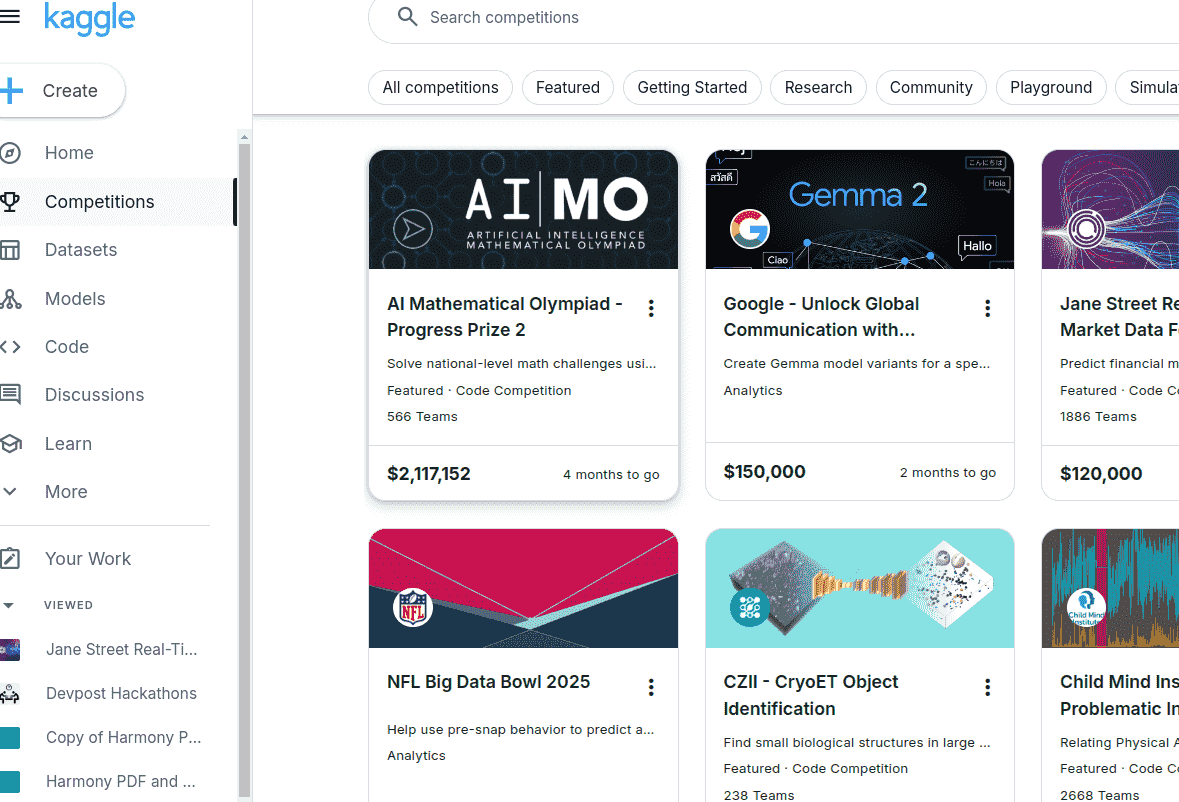
Above: screenshot of the main page of Kaggle
The largest provider of online AI hackathons and coding challenges is the website Kaggle, which allows organisers to host a competition and participants can submit their entries over the web. Some competitions have very large cash prizes and are won by teams which may even be corporate teams, while many competitions are much smaller or may have no cash prize at all. In November 2024, Kaggle was hosting 362 active competitions with first prizes ranging from $250 to over a million dollars, with a median first prize of $25,000.
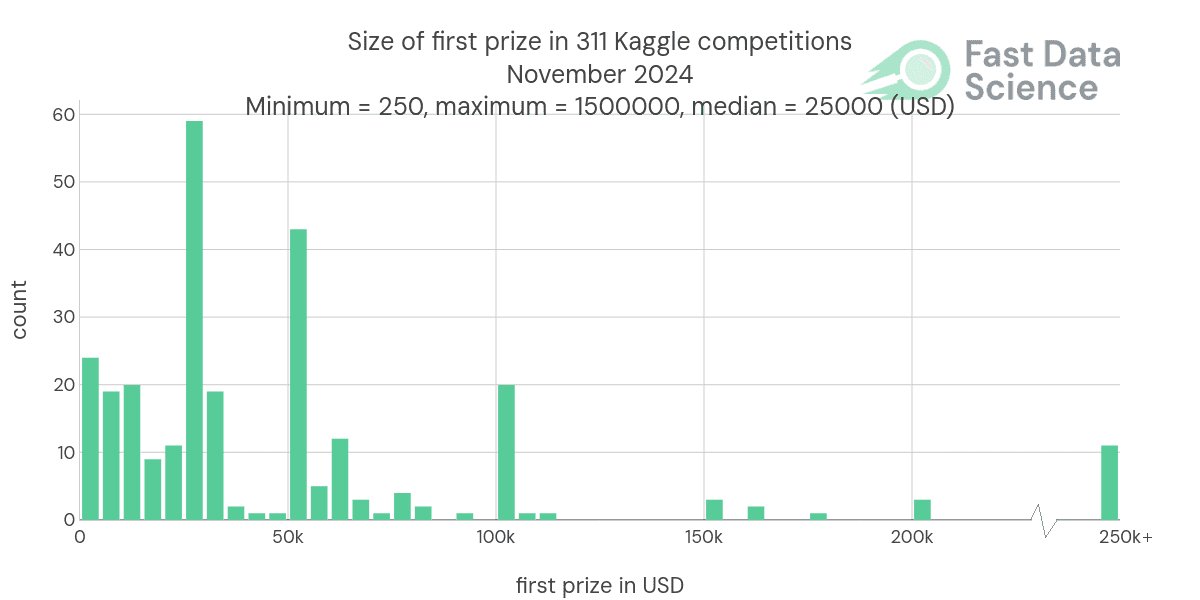
Some of the most accessible AI and machine learning competitions on Kaggle are predictive modelling challenges, where you are provided with a set of training data with independent and dependent variables and a set of independent variables only for the test data, and your task is to generate predictions on the test data and submit them to Kaggle for evaluation. You never see the true desired output values of the test data. An example of a predictive modelling challenge in an AI hackathon could be to predict the probability of a loan default, or to predict the amount a customer is going to spend based on demographic information and past purchase patterns, or the probability of an employee quitting. As you might guess, these kinds of challenges have very high value for businesses and you’re likely to encounter these in a corporate-sponsored hackathon.
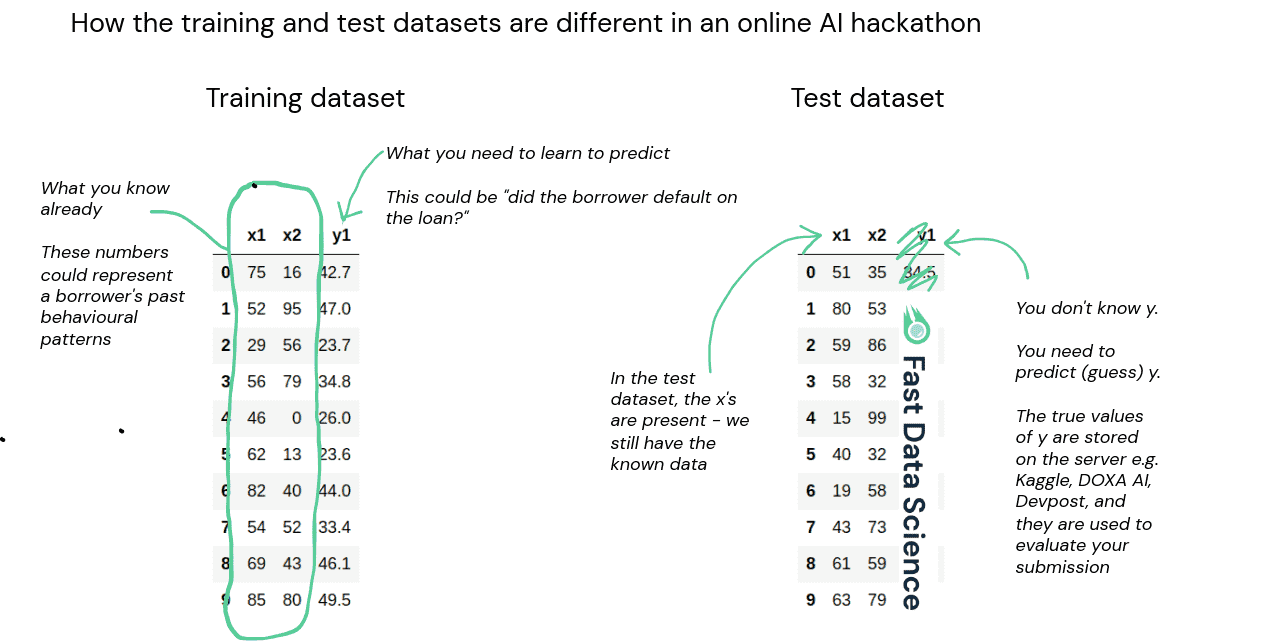
The training dataset in an AI hackathon often contains x and y values, whereas the test dataset that you’re given will only contain the x values, and your job is to predict the missing y values.
A software development hackathon could be adjudicated by a panel based on criteria such as code quality, efficiency, user experience (UX), and teamwork, which can end up being rather subjective. It is possible to judge an AI hackathon on the same criteria, and in-person AI hackathons often have a panel of human judges just like a software development hackathon.
Many online AI hackathon providers like Kaggle, Devpost, and DOXA AI use an “unseen test set” where your code or the output of your code is evaluated and scored automatically according to the gold standard which is known only to the competition organisers. This means that evaluation is automatic and you may make multiple submissions, although most platforms limit the number of submissions you are allowed to make per day or per hour, to avoid contestants bombarding them with submissions to try to reverse-engineer the test set, or to over-fit their model to the test set. For example, many Kaggle competitions limit you to 5 submissions in a 24-hour period.
Hackathons look great on your CV and often provide certificates which you can share on your LinkedIn or include in your portfolio to make yourself more attractive to future employers.
A hackathon is also a chance to work with a diverse range of AI experts and other domain experts, and this will always be a valuable learning experience, allowing you to form connections with people that you otherwise might not encounter.
You may also enjoy the experience of achieving something for the public good as part of a team.
Last of all, AI hackathons are fun!
We would like to improve Harmony’s PDF parsing algorithm. Your challenge is to develop an improved algorithm for identifying mental health survey questions and selectable answers in plain text. You can win up to £1000 in vouchers!
Harmony matching challenge - this is an online AI hackathon challenge to fine-tune a large language model for the online tool Harmony.
We would like to improve Harmony’s matching algorithm. Sometimes, Harmony mistakenly thinks that sentences are similar when a psychologist would consider them dissimilar, or vice versa. We would like to improve Harmony with a fine tuned large language model. We have made an online competition where you can improve on the off-the-shelf LLMs which we are currently using. You can win up to £500 in vouchers!
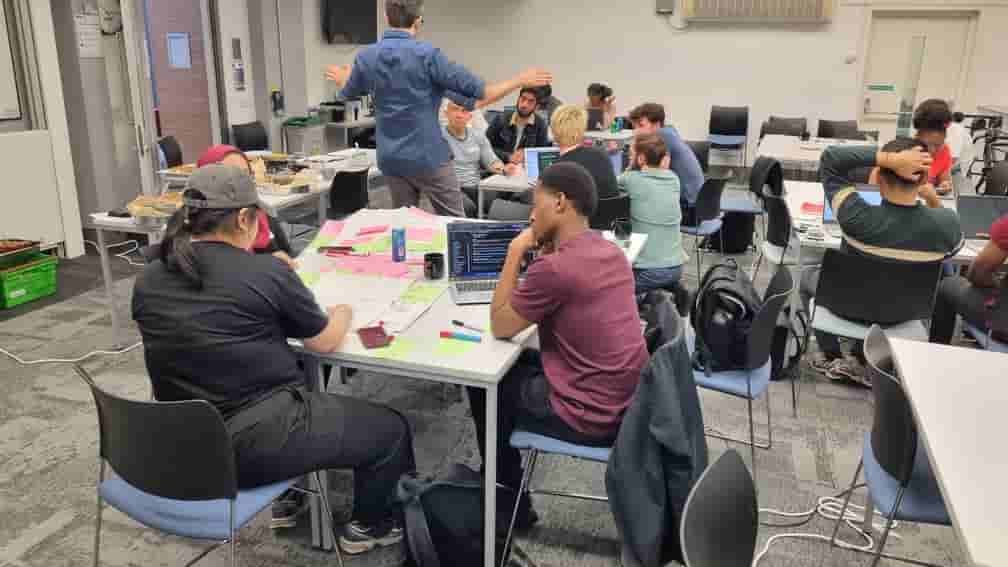
Above: the AI hackathon run for the Harmony project on 3 June 2024.
Not necessarily! While having a strong foundation in programming and data science is helpful, offline and online AI hackathons are inclusive events that welcome participants of all skill levels. Many teams form with a mix of experts and beginners, allowing for collaborative learning and skill development.
Also, a team will need users, people with domain knowledge, designers, solution architects, and many other skill sets. If the hackathon is about pharmaceuticals and you have a pharmacology degree, your input will be invaluable no matter how much or little you know about data science. Often, the missing ingredient in an AI team is the domain expert, and one problem on many AI projects I’ve been on has been finding domain experts (e.g. medicine, pharma, legal, finance, or construction) who have the time to engage with us and explain to us the basics of their field.
Most AI hackathons are free to enter, with organisers often covering expenses like food, drinks, and sometimes even accommodation. However, some offline AI hackathons may charge a nominal fee to cover administrative costs. Non-profits and charities in particular may be constrained by budget. I have never heard of an online AI hackathon charging a fee to participate.
Of course, you may even win money if you do well in an AI hackathon! It would be unusual for there to be any large fee to enter and I would advise to stay away from an AI hackathon that wants to charge you a lot of money. After all, you are helping solve a problem for the hosting organisation.
To increase your chances of winning an AI hackathon:
Both online and in-person AI hackathons offer unique advantages. Online AI hackathons provide flexibility and accessibility, allowing participants from around the world to collaborate. In-person hackathons foster stronger team bonds and offer opportunities for real-time collaboration and mentorship.
A hybrid AI hackathon is sometimes seen as a middle way, offering the strengths of both online and offline hackathons. However, it’s very hard to pull off a hybrid event. If you have fifty people in a room, how can you make sure that participants in other locations are adequately included in all the interactions, networking, and “water-cooler” moments that occur organically in an in-person event?
It’s very hard to avoid a hybrid event turning into a two-tier process where those who attend in person benefit a lot more than the remote attendees, so I would advise against organising a hybrid online/offline AI hackathon unless you are a very experienced hybrid events organiser, or you have a professional events manager taking care of the details.
Online AI hackathons are flexible and you can run your challenge for many months. With an online AI hackathon, you are removing travel restrictions, so participants can join from the other side of the world. Since you won’t need to book a venue, an online AI hackathon is highly scalable and you could easily attract thousands of participants, especially if the evaluation process is automated.
For the Harmony hackathons, we’ve organised some online and some in-person AI hackathon events, and we are still experimenting to find out which format works best. Overall, online AI hackathons are less work and less organisation, since you don’t need to worry about venue hire and catering any more. However, attracting participants has been a challenge for the online AI hackathon format. An offline event has the advantage that you can easily put it on Meetup.com or Eventbrite and people will sign up (although you should expect only 50% of the online signups to turn up in person).
To ensure a successful AI hackathon, tell your participants well in advance before the date, and ensure that you have booked the venue and catering, and you know the times you can enter and leave the building. Keep your participants warm before the start date by arranging online webinars and encouraging them to ask questions. Make it clear what prizes you are offering and how participants will be paid (cash, vouchers, etc).
On the day of the hackathon, make sure you’re there nice and early to ensure access to the building and welcome any early arrivals. Provide the participants with post-it notes and pens to facilitate feedback and idea generation. Encourage active engagement by inviting questions and suggesting they sign up for a mailing list to stay updated on future developments - make sure you get permission to contact them afterwards, and ideally to use their photos!
Ensure that the judging runs smoothly and quickly. You don’t want to keep your participants waiting!
Conclude the day with a heartfelt thank-you email, expressing gratitude for their participation and hinting at the next phase of the project. This approach fosters a sense of community and keeps participants invested in the initiative.
In 2024, we were tasked with organising some online and in-person AI hackathons for the Harmony project. The first hackathon that we organised was an in-person event at UCL on 3 June 2024, and here’s how it went.
Out of our core team, only one of us had been to a hackathon before, for a previous employer. That was a two day corporate event with travel abroad and an overnight stay in a resort hotel. This was far beyond our budget in the case of Harmony!
Since we hadn’t organised a hackathon before, our first thought was to turn to the internet and find a company or organisation that we could pay to take responsibility for the hackathon. The first few companies that we spoke to turned out to be very expensive with costs in excess of £60,000 for a single day event in some cases! These companies offer an all-inclusive package where they will take care of venue, catering, and the problem statement and coding side of things. It turned out that there is a separate corporate market for hackathons with very different standard pricing, as paying a corporate-level budget for a one-day event was not feasible for us. We learned that it was better to find volunteer organisations, nonprofits and student unions and ask around there.
In the end, we booked a venue via the university booking system, so we didn’t have to pay booking charges, and we booked the university caterers for 60 people, so the total organisational cost came to below £1000. About 40 people turned up on the day. We put our event on Eventbrite so that people would find us.
From the university and our networks, we recruited about 6 facilitators to come and assist on the day (helping people install software, and answering questions).
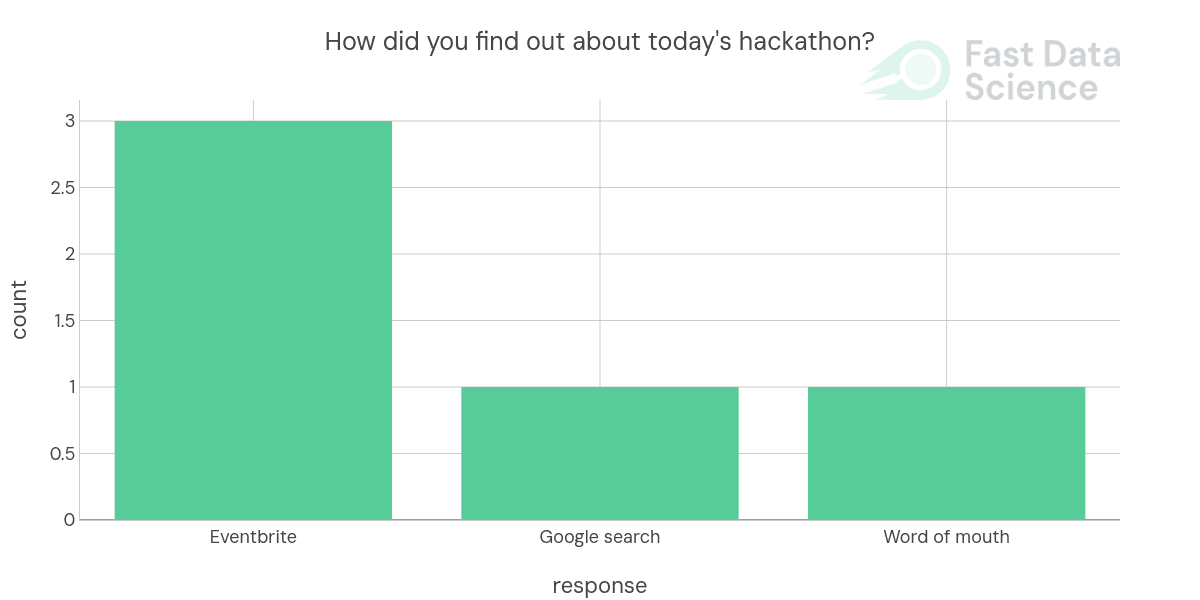
When we surveyed the participants after the AI hackathon, it turned out that Eventbrite was the largest channel that attendees found us on.
In the end, there was a huge amount of interest in our hackathon and it quickly became oversubscribed with new participants on a waiting list. On the day, the turnout was about 60% of those who had registered online. They split into teams and each team chose a different task to improve our open source project.
The people who attended often had recently completed a masters or boot camp in data science, or were in the middle of a career change and aiming to move into data science. Overall, the day was a success, although next time I would recommend to go with an events organiser if your budget permits it.
The winning team (“Cheemu”) added 4 languages to Harmony
The runners up (“Anomalies”) did a UX design on paper and asked questions (ad hoc survey) of what the tool should do
Other participants added 1 more language, did an investigation into clinical documents and finding similar measurements, and one participant made a voice bot that allows users to query psychology questionnaires.- find and assign specific mentors as experts to the challenges
An unexpected bonus was that our project got some nice Google reviews which helped to raise our profile.
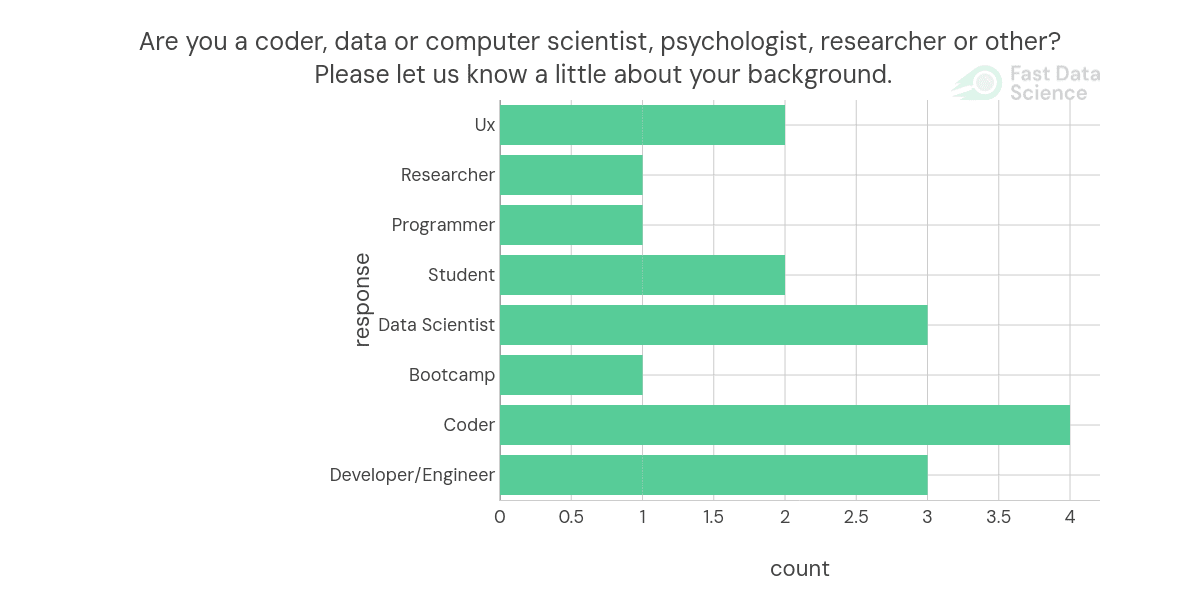
After running the AI hackathon, we sent round a quick Google Forms survey so that we could understand where our attendees were coming from. Most had a technical background but a few were new to AI after recently completing a boot camp, and there were some who were completely outside software development also.
Hackerearth has posted “The complete guide to organizing a successful hackathon” which I strongly recommend reading if you are running your own AI hackathon.
There are lots of impactful results you can achieve in an AI hackathon. Here are some ideas…
I would advise to choose something that’s achievable in the limited time available, and make sure all resources are available and easily accessible so that participants can hit the ground running on the day of the hackathon.
| Online AI hackathon provider | Description |
|---|---|
| DOXA AI | A platform for running engaging online AI hackathons such as the Harmony matching challenge, where you can compete to fine tune the best LLM for the psychology domain, and ClimateHack.AI 2023, where you are challenged to develop a cutting-edge machine learning model for predicting near-term site-level solar power production using satellite imagery, weather forecasts and air quality data better than the current state of the art. |
| Devpost | A platform for software engineers participate in online and in-person hackathons such as the “Google Chrome Built-in AI Challenge”, where contestants develop a web application or Chrome Extension that uses one or more Chrome built-in AI APIs to interact with integrated models. |
| Google Summer of Code | Google Summer of Code is an international annual program which runs every summer. Google awards stipends to contributors to develop free and open-source (FOSS) software during the summer. |
| Kaggle | Kaggle is an online platform for data scientists and AI practitioners to participate in competitions and access datasets for improving their machine learning skills. |
| AIcrowd | AIcrowd focuses on diverse problems in AI with real-world impact and aims to get data scientists and enthusiasts to collaborate. |
| MLH (Major League Hacking) | Hackathon league for US colleges. Organises both in-person and online AI hackathons. |
If you’re running an in-person AI hackathon yourself, you can list it on one of these websites so that people will find it.
The world’s largest AI hackathons are often hosted by major tech companies like Google, Microsoft, or Amazon. These events attract thousands of participants from around the globe and offer incredible opportunities for learning, networking, and innovation. However, as at November 2024, the “Generative AI hackathon” with the largest number of participants was a hackathon was aimed at promoting tech talent in Mumbai, which was organised by the Tech Entrepreneurs Association of Mumbai (TEAM), Made in Mumbai, Quantiphi and LogiNext (all India), in Mumbai, India, on 26 October 2024.[2]
By participating in AI hackathons, you can gain practical experience, collaborate with talented individuals, and contribute to the advancement of AI technology. Many hackathons will provide certficates and endorsements which can help you progress in your career.
Click to read more about AI in research at Fast Data Science.
OpenBSD Hackathons. OpenBSD. Retrieved 29 Nov 2024.
Guinness World Records, Most participants in a generative AI hackathon. Retrieved 29 Nov 2024.
Ready to take the next step in your NLP journey? Connect with top employers seeking talent in natural language processing. Discover your dream job!
Find Your Dream Job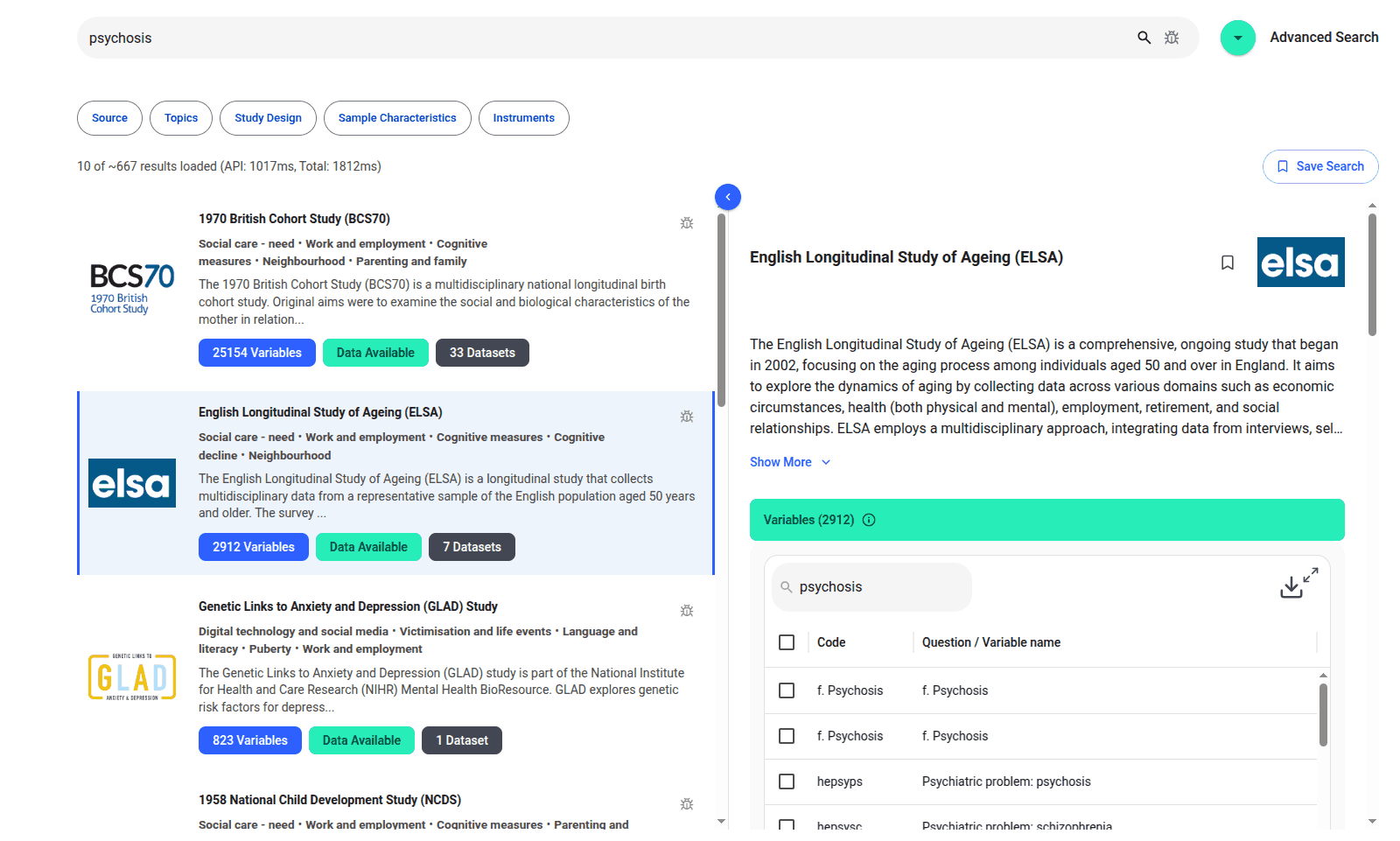
We are excited to introduce the new Harmony Meta platform, which we have developed over the past year. Harmony Meta connects many of the existing study catalogues and registers.

Guest post by Jay Dugad Artificial intelligence has become one of the most talked-about forces shaping modern healthcare. Machines detecting disease, systems predicting patient deterioration, and algorithms recommending personalised treatments all once sounded like science fiction but now sit inside hospitals, research labs, and GP practices across the world.

If you are developing an application that needs to interpret free-text medical notes, you might be interested in getting the best possible performance by using OpenAI, Gemini, Claude, or another large language model. But to do that, you would need to send sensitive data, such as personal healthcare data, into the third party LLM. Is this allowed?
What we can do for you